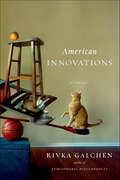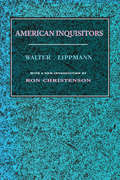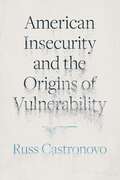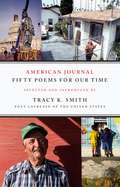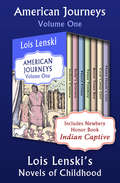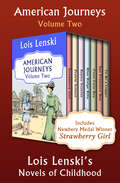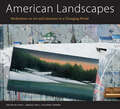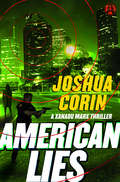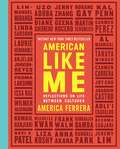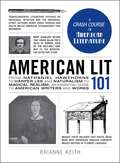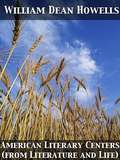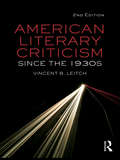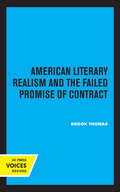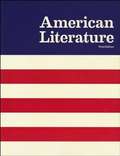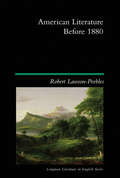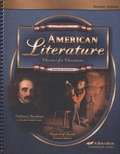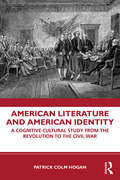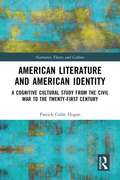- Table View
- List View
American Innovations: Stories
by Rivka GalchenA BRILLIANT NEW COLLECTION OF SHORT STORIES FROM THE "CONSPICUOUSLY TALENTED" (TIME) RIVKA GALCHENWinner of the Danuta Gleed Literary Award A New York Times Book Review Notable BookChosen as one of fifteen remarkable books by women that are shaping the way we read and write in the 21st century by the book critics of The New York TimesIn one of the intensely imaginative stories in Rivka's Galchen's American Innovations, a young woman's furniture walks out on her. In another, the narrator feels compelled to promise to deliver a takeout order that has incorrectly been phoned in to her. In a third, the petty details of a property transaction illuminate the complicated pains and loves of a family. The tales in this groundbreaking collection are secretly in conversation with canonical stories, reimagined from the perspective of female characters. Just as Wallace Stevens's "Anecdote of the Jar" responds to John Keats's "Ode on a Grecian Urn," Galchen's "The Lost Order" covertly recapitulates James Thurber's "The Secret Life of Walter Mitty," while "The Region of Unlikeness" is a smoky and playful mirror to Jorge Luis Borges's "The Aleph." The title story, "American Innovations," revisits Nikolai Gogol's "The Nose." By turns realistic, fantastical, witty, and lyrical, these marvelously uneasy stories are deeply emotional and written in exuberant, pitch-perfect prose. Whether exploring the tensions in a mother-daughter relationship or the finer points of time travel, Galchen is a writer like none other today.
American Inquisitors
by Walter LippmannAmerican Inquisitors is one of the small gems among Walter Lippmann's larger books. Written in response to the trials of John Scopes and William McAndrew in 1925 and 1927, this volume contains a succinct analysis of a basic problem of democracy: the conflict between intellectual freedom and majority rule. In both cases, the state, acting in the name of popular sovereignty, sought to suppress teaching that was contrary to the tenets of religious fundamentalism and patriotic tradition. In distilling the arguments surrounding both trials, Lippmann sounds a warning against the tyranny of the majority and challenges people to rethink their theories of liberty and democracy.American Inquisitors consists of five related dialogues, each exploring a different dilemma at the heart of democratic political theory. The first two establish the principles of majority rule and freedom of the mind in the persons of William Jennings Bryan and Thomas Jefferson, with Socrates urging a reexamination of all principles..These dialogues debate the will and the rational capacity of the people to rule and demonstrate the relative nature of freedom in democratic society.The third and fourth dialogues set a fundamentalist against a modernist and an Americanist against a scholar. Lippmann resists easy stereotyping and puts challenging insights and plausible arguments into the mouths of all the parties. These dialogues ask whether commitment to community comes before intellectual inquiry, 'or whether the search for truth precedes identity. The final dialogue, between Socrates and a conscientious teacher, attempts to define the mission of teaching and determine when and how to face the consequences of truth. Lippmann concludes that the program of liberty is to deprive the sovereign of absolute and arbitrary rule. Taken as a whole, the dialogues constitute an essential consistency within Lippmann's political thought, and delineate a recurring problem hi American politcal culture. American Inquisit
American Insecurity and the Origins of Vulnerability
by Russ CastronovoAn incisive critique that examines the origins of contemporary American ideas about surveillance, terrorism, and white supremacyFor more than three centuries, Americans have pursued strategies of security that routinely make them feel vulnerable, unsafe, and insecure. American Insecurity and the Origins of Vulnerability probes this paradox by examining American attachments to the terror of the sublime, the fear of uncertainty, and the anxieties produced by unending racial threat.Challenging conventional approaches that leave questions of security to policy experts, Russ Castronovo turns to literature, philosophy, and political theory to show how security provides an organizing principle for collective life in ways that both enhance freedom and limit it. His incisive critique ranges from frontier violence and white racial anxiety to insurgent Black print culture and other forms of early American terror, uncovering the hidden logic of insecurity that structures modern approaches to national defense, counterterrorism, cybersecurity, surveillance, and privacy. Drawing on examples from fiction, journalism, tracts, and pamphlets, Castronovo uncovers the deep affective attachments that Americans have had since the founding to the sources of fear and insecurity that make them feel unsafe.Timely and urgent, American Insecurity and the Origins of Vulnerability sheds critical light on how and why the fundamental political desire for security promotes unease alongside assurance and fixates on risk and danger while clamoring for safety.
American Journal: Fifty Poems for Our Time
by Tracy K. SmithA landmark anthology envisioned by Tracy K. Smith, 22nd Poet Laureate of the United StatesAmerican Journal presents fifty contemporary poems that explore and celebrate our country and our lives. 22nd Poet Laureate of the United States and Pulitzer Prize winner Tracy K. Smith has gathered a remarkable chorus of voices that ring up and down the registers of American poetry. In the elegant arrangement of this anthology, we hear stories from rural communities and urban centers, laments of loss in war and in grief, experiences of immigrants, outcries at injustices, and poems that honor elders, evoke history, and praise our efforts to see and understand one another. Taking its title from a poem by Robert Hayden, the first African American appointed as Consultant in Poetry to the Library of Congress, American Journal investigates our time with curiosity, wonder, and compassion. Among the fifty poets included are: Jericho Brown, Natalie Diaz, Matthew Dickman, Mark Doty, Ross Gay, Aracelis Girmay, Joy Harjo, Terrance Hayes, Cathy Park Hong, Marie Howe, Major Jackson, Ilya Kaminsky, Robin Coste Lewis, Ada Límon, Layli Long Soldier, Erika L. Sánchez, Solmaz Sharif, Danez Smith, Susan Stewart, Mary Szybist, Natasha Trethewey, Brian Turner, Charles Wright, and Kevin Young.
American Journals
by Albert Camus Hugh Levick Roger GuilliotFurnishing tidbits for Camus scholars, providing his take on North and South America, notably New York City and cities of Brazil, along with Buenos Aires and Santiago, Camus seems to have met only a few people he liked, and maybe two or three sites impressed him. He reflects on suicide. No it is not a cheerful work, but it is vivid. For Americans, this work if valuable for he describes our homeland.
American Journeys Volume One: Lois Lenski's Novels of Childhood (American Journeys #1)
by Lois LenskiFrom a Newbery Award–winning author: Seven beloved classics that beautifully capture growing up and overcoming challenges across America. In her Newbery Honor Book, Indian Captive, and her Regional America series, six of which are collected here, author/illustrator Lois Lenski presents realistic portrayals of unforgettable young people facing hardships in a range of areas across the country. Based on a true story, Indian Captive tells the compelling chronicle of a twelve-year-old girl kidnapped by the Shawnee in 1758 Pennsylvania. Beginning with the Children’s Book Award winner Judy’s Journey, Lenski depicted kids’ experiences in different regions of mid-twentieth-century America—from East Coast migrant workers to a Texas girl whose family is dealing with drought, from an eleven-year-old boy in oil-boom Oklahoma to the daughter of coal miners in West Virginia, from a family in a flooded western Connecticut town to an African American girl in the 1950s coping with moving north with the help of her loving grandmother. Beyond changing the face of children’s literature, Lenski’s stories continue to endure because of their moving and believable depictions of young people from often overlooked communities. Through her art, Lenski gave these characters a voice that still rings loud and clear for modern readers. This ebook includes Indian Captive, Judy’s Journey, Flood Friday, Texas Tomboy, Boom Town Boy, Coal Camp Girl, and Mama Hattie’s Girl.
American Journeys Volume Two: Lois Lenski's Novels of Childhood (American Journeys #2)
by Lois LenskiFrom a Newbery Award–winning author: These seven beloved classics beautifully capture growing up and overcoming challenges across America. In her Regional America series, author and illustrator Lois Lenski presents realistic portrayals of unforgettable young people facing hardships and triumphs across the diverse United States. The Newbery Medal–winning Strawberry Girl follows day-to-day life for Birdie and her family on a berry farm in Florida, as they deal with heat, droughts, cold snaps, and difficult neighbors. In Prairie School, a young girl gets stranded at her South Dakota school by a winter storm; in Bayou Suzette, the Cajun Suzette strikes up an unlikely friendship with a Native American girl in the swamps of Louisiana; and Blue Ridge Billy is the story of a boy who dreams of playing the fiddle. Other novels follow the lives of a young farmer who wants to quit school and work on his family&’s Iowa farm; an Asian-American boy adjusting to city life in San Francisco&’s Chinatown; and an adolescent lumberjack in the forests of Oregon. Beyond changing the face of children&’s literature, Lenski&’s stories endure because of their moving and believable depictions of young people from often overlooked communities. Through her art, Lenski gives these characters a voice that continues to ring loud and clear for modern readers. This ebook includes Strawberry Girl, Prairie School, Bayou Suzette, Blue Ridge Billy, Corn-Farm Boy, San Francisco Boy, and To Be a Logger.
American Landscapes: Meditations on Art and Literature in a Changing World (University of Mississippi Museum and Historic Houses Series)
by Ann J. Abadie and J. Richard GruberAmerican Landscapes: Meditations on Art and Literature in a Changing World is a major contemporary survey of landscapes in art and literature of the United States, especially the American South. Inspired by William Dunlap’s extraordinary landscape Meditations on the Origins of Agriculture in America and a collection of forty paintings and photographs by Southern artists, this volume brings together artists, authors, and scholars to present new perspectives on art and literature both past and present. The volume includes art and text from artists John Alexander, Jason Bouldin, William Dunlap, Carlyle Wolfe Lee, Ke Francis, Linda Burgess, Randy Hayes; photographers Sally Mann, Ed Croom, and Huger Foote; museum directors Betsy Bradley, Jane Livingston, and Julian Rankin; and authors W. Ralph Eubanks, John Grisham, J. Richard Gruber, Jessica B. Harris, Lisa Howorth, Julia Reed, Natasha Trethewey, Curtis Wilkie, Joseph M. Pierce, and Drew Gilpin Faust. This diverse group explores major eras of American history portrayed in Dunlap’s painting, a landscape that evokes the displacement and genocide of Native Americans, the enslavement of Africans, the Civil War, and William Faulkner’s fiction. They examine the history of landscape art in America, connecting art with the works of major writers like William Faulkner, Eudora Welty, Natasha Trethewey, and Jesmyn Ward. In eighteen new essays written during the pandemic and since the events of January 6, 2021, the essayists emphasize how the key issues Dunlap addressed in his 1987 artwork have become part of the national discourse and make his work even more vital today.
American Lies: A Xanadu Marx Thriller (Xanadu Marx #3)
by Joshua CorinFor wild-card ex-FBI agent Xanadu Marx, the war on terror hits close to home—thanks to a remorseless enemy who’s all too familiar—in this explosive thriller. “Joshua Corin is a master storyteller.”—Douglas Preston, #1 bestselling co-creator of the Pendergast novels It begins on a beautiful day in Atlanta, with a mosque full of Muslim worshippers celebrating the end of Ramadan. The festivities are cut brutally short when a military drone appears in the sky—and launches a missile into the building. Then, at a mosque in Dearborn, Michigan, another peaceful gathering is torn apart by the violent blast of a suicide bomber. The attacks set the entire nation on edge, with authorities scrambling to make sense of the situation and keep the populace calm while pundits and politicians of all stripes fight for time in the spotlight. But for ex-FBI agent Xanadu Marx, her first instinct is revenge. Unwilling to let such savagery go unanswered, she plunges into the investigation the police have started—but only she can finish. Disregarding official warnings from the government and outright threats from others, she follows a trail of homegrown hatred and violence to uncover a conspiracy so cold-blooded that no one will believe her—even if she lives long enough to tell. . . .
American Like Me: Reflections on Life Between Cultures
by America FerreraFrom award-winning actress and political activist America Ferrera comes a vibrant and varied collection of first person accounts from prominent figures about the experience of growing up between cultures. <P><P>America Ferrera has always felt wholly American, and yet, her identity is inextricably linked to her parents’ homeland and Honduran culture. Speaking Spanish at home, having Saturday-morning-salsa-dance-parties in the kitchen, and eating tamales alongside apple pie at Christmas never seemed at odds with her American identity. Still, she yearned to see that identity reflected in the larger American narrative. <P><P>Now, in American Like Me, America invites thirty-one of her friends, peers, and heroes to share their stories about life between cultures. We know them as actors, comedians, athletes, politicians, artists, and writers. However, they are also immigrants, children or grandchildren of immigrants, indigenous people, or people who otherwise grew up with deep and personal connections to more than one culture. <P><P>Each of them struggled to establish a sense of self, find belonging, and feel seen. And they call themselves American enthusiastically, reluctantly, or not at all. Ranging from the heartfelt to the hilarious, their stories shine a light on a quintessentially American experience and will appeal to anyone with a complicated relationship to family, culture, and growing up. <P><b>A New York Times Bestseller</b>
American Lit 101: From Nathaniel Hawthorne to Harper Lee and Naturalism to Magical Realism, an essential guide to American writers and works
by Brianne KeithFrom poetry to fiction to essays, American Lit 101 leaves no page unturned! Edgar Allan Poe. Willa Cather. Henry David Thoreau. Mark Twain. The list of important American writers goes on and on. These voices played a vital role in shaping the scope of American literature, and the United States itself. But too often, textbooks reduce this storied history to dry text that would put even a tenured professor to sleep.American Lit 101 is an engaging and comprehensive guide through the major players in American literature. From colonialism to postmodernism and every literary movement in between, this primer is packed with hundreds of entertaining tidbits and concepts, along with easy-to-understand explanations on why each author's work was important then and still relevant now. So whether you're looking for a refresher course on key American literature or want to learn about it for the first time, American Lit 101 has all the answers--even the ones you didn't know you were looking for.
American Literary Centers (from Literature and Life)
by William Dean HowellspubOne. info present you this new edition. One of the facts which we Americans have a difficulty in making clear to a rather inattentive world outside is that, while we have apparently a literature of our own, we have no literary centre. We have so much literature that from time to time it seems even to us we must have a literary centre. <P> <P> We say to ourselves, with a good deal of logic, Where there is so much smoke there must be some fire, or at least a fireplace. But it is just here that, misled by tradition, and even by history, we deceive ourselves. Really, we have no fireplace for such fire as we have kindled; or, if any one is disposed to deny this, then I say, we have a dozen fireplaces; which is quite as bad, so far as the notion of a literary centre is concerned, if it is not worse.
American Literary Criticism Since the 1930s
by Vincent B. LeitchAmerican Literary Criticism Since the 1930s fully updates Vincent B. Leitch’s classic book, American Literary Criticism from the 30s to the 80s following the development of the American academy right up to the present day. Updated throughout and with a brand new chapter, this second edition: provides a critical history of American literary theory and practice, discussing the impact of major schools and movements examines the social and cultural background to literary research, considering the role of key theories and practices provides profiles of major figures and influential texts, outlining the connections among theorists presents a new chapter on developments since the 1980s, including discussions of feminist, queer, postcolonial and ethnic criticism. Comprehensive and engaging, this book offers a crucial overview of the development of literary studies in American universities, and a springboard to further research for all those interested in the development and study of Literature.
American Literary Realism and the Failed Promise of Contract
by Brook ThomasThis title is part of UC Press's Voices Revived program, which commemorates University of California Press’s mission to seek out and cultivate the brightest minds and give them voice, reach, and impact. Drawing on a backlist dating to 1893, Voices Revived makes high-quality, peer-reviewed scholarship accessible once again using print-on-demand technology. This title was originally published in `1997.
American Literary Studies
by Michael A. Elliott Claudia StokesAmerican Literary Studies: A Methodological Reader gathers together leading scholars of American literature to address the questions of methodology that have invigorated and divided their field: the rise of interdisciplinarity and the wealth of theoretical methods now available to the critic of American literature. Their engagement with these issues takes a unique form in this book: Each scholar has chosen a methodologically innovative essay, which he or she then introduces, explaining why it is both exemplary in its approach and central to the issues that most engage American literary scholarship today. The book includes both an introduction to the controversial interdisciplinary methods that have made American literary studies such a vibrant field, as well as groundbreaking scholarship on topics as diverse as James Fenimore Cooper, minstrel songs, and Lakota Indian stories. This volume has been designed to serve as a starting point for teachers and students to explore the fundamental questions of American literary scholarship: What does "method" mean in literary studies? Which texts should it study? What makes literary study unique? What should literary scholarship do? American Literary Studies argues that these questions can only be answered through a discussion of the interdisciplinary methods currently in use by scholars today. Finally, an original introduction by Michael A. Elliott and Claudia Stokes explains why questions of method are crucial to American literary studies and how past scholars of American literature have tried to answer them. Contributors include: Lauren Berlant, Russ Castronovo, Wai Chee Dimock, Ann duCille, Michael A. Elliott, Frances Smith Foster, Elaine A. Jahner, Rob Kroes, Arnold Krupat, Paul Lauter, Marilee Lindemann, W. T. Lhamon, Jr., Christopher J. Looby, David Palumbo-Liu, Roy Harvey Pearce, Lora Romero, Ramón Saldívar, Carroll Smith-Rosenberg, Werner Sollors, Claudia Stokes, Claudia Tate, Paula A. Treichler, Priscilla Wald, Michael Warner, Laura Wexler, Sau-ling C. Wong
American Literature
by Paul Garrison Michael Pope Joshua Privett Barbara RooksAcquaint your students with the prose and poetry of American authors from the early days of colonization through the present. Organized chronologically and by context, this textbook covers the historical context, literary movements, and principle players that helped to shape American culture and society. Each lesson is broken down into Before/During/After Reading sections. The first highlights key aspects of literature, explains key concepts, defines vocabulary, and helps orient students to the work. The "during" section presets the literature with side-bar margin questions. The last section includes "Think and Discuss" questions that review and assess comprehension of emphases and ideas. Author Biography pages provide an overview of authors' lives, and Chapter Reviews outline important concepts to help prepare students for tests. Written from a Christian worldview, this course encourages students evaluate literature in the light of Scripture and determine whether or not works are biblically sound.
American Literature
by George KearnsAmerican Literature is an anthology, a collection of fiction, poetry, drama, and nonfiction. The purpose of American Literature is to introduce you to some highly enjoyable writing and to help you think logically and creatively about it. In fact, as the writers in this book so powerfully demonstrate, the more you think about literature the richer your insights will be.
American Literature
by Molly Harrington DuganA collection of literature written by various authors from several different genres. Contains historical info, literary term descriptions, and a study guide.
American Literature Before 1880 (Longman Literature In English Series)
by Robert Lawson-PeeblesAmerican Literature Before 1880 attempts to place its subject in the broadest possible international perspective. It begins with Homer looking westward, and ends with Henry James crossing the Atlantic eastwards. In between, the book examines the projection of images of the East onto an as-yet unrecognised West; the cultural consequences of Viking, Colombian, and then English migration to America; the growth and independence of the British American colonies; the key writers of the new Republic; and the development of the culture of the United States before and after the Civil War. It is intended both as an introduction for undergraduates to the richness and variety of American Literature, and as a contribution to the debate about its distinctive nature. The book therefore begins with a lengthy survey of earlier histories of American Literature.
American Literature Classics for Christians (Fourth Edition)
by Pensacola Christian CollegeLaunch into literature with the exciting stories from Mark Twain, Washington Irving, Edgar Allen Poe, and many more. American Literature is a compilation of short stories, poems, and other selections that are organized by genre to exemplify the specific characteristics of the time period. Learn about the dialects in American legends, irony and satire in the short stories, local color writing during the Realistic period, and the rich imagery during the Romantic Era. With detailed information about the authors and their writing ability, literary terms and definitions, and many selections of American art, this text gives an excellent portrayal of American Literature.
American Literature Classics for Christians (Fourth Edition)
by The Editors at the Pensacola Christian CollegeThe book presents great works of American literature and evaluates them in the light of the truths of God's Word, in order that the student may further understand and articulate truth as God has established it.
American Literature and American Identity: A Cognitive Cultural Study From the Revolution Through the Civil War
by Patrick Colm HoganAmerican Literature and American Identity addresses the crucial issue of identity formation, especially national identity, in influential works of American literature. Patrick Colm Hogan uses techniques of cognitive and affective science to examine the complex and often highly ambivalent treatment of American identity in works by Melville, Cooper, Sedgwick, Apess, Stowe, Jacobs, Douglass, Hawthorne, Poe, and Judith Sargeant Murray. Hogan focuses on the issue of how authors imagined American identity—specifically, as universal, democratic egalitarianism—in the face of the nation’s clear and often brutal inequalities of race and sex. In the course of this study, Hogan advances our understanding of nationalism in general, American identity in particular, and the widely read literary works he examines.
American Literature and American Identity: A Cognitive Cultural Study from the Civil War to the Twenty-First Century (Narrative Theory and Culture)
by Patrick Colm HoganIn recent years, cognitive and affective science have become increasingly important for interpretation and explanation in the social sciences and humanities. However, little of this work has addressed American literature, and virtually none has treated national identity formation in influential works since the Civil War. In this book, Hogan develops his earlier cognitive and affective analyses of national identity, further exploring the ways in which such identity is integrated with cross-culturally recurring patterns in story structure. Hogan examines how authors imagined American identity—understood as universal, democratic egalitarianism—in the face of the nation’s clear and often brutal inequalities of race, sex, and sexuality, exploring the complex and often ambivalent treatment of American identity in works by Charlotte Perkins Gilman, Eugene O’Neill, Lillian Hellman, Djuna Barnes, Amiri Baraka, Margaret Atwood, N. Scott Momaday, Spike Lee, Leslie Marmon Silko, Tony Kushner, and Heidi Schreck.
American Literature and American Identity: A Cognitive Cultural Study from the Civil War to the Twenty-First Century (Narrative Theory and Culture)
by Patrick Colm HoganIn recent years, cognitive and affective science have become increasingly important for interpretation and explanation in the social sciences and humanities. However, little of this work has addressed American literature, and virtually none has treated national identity formation in influential works since the Civil War. In this book, Hogan develops his earlier cognitive and affective analyses of national identity, further exploring the ways in which such identity is integrated with cross-culturally recurring patterns in story structure. Hogan examines how authors imagined American identity—understood as universal, democratic egalitarianism—in the face of the nation’s clear and often brutal inequalities of race, sex, and sexuality, exploring the complex and often ambivalent treatment of American identity in works by Charlotte Perkins Gilman, Eugene O’Neill, Lillian Hellman, Djuna Barnes, Amiri Baraka, Margaret Atwood, N. Scott Momaday, Spike Lee, Leslie Marmon Silko, Tony Kushner, and Heidi Schreck.
